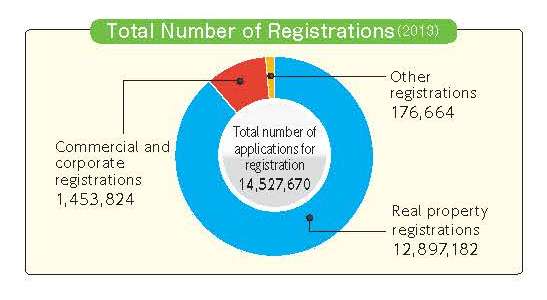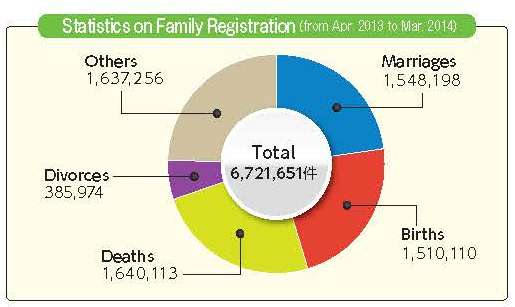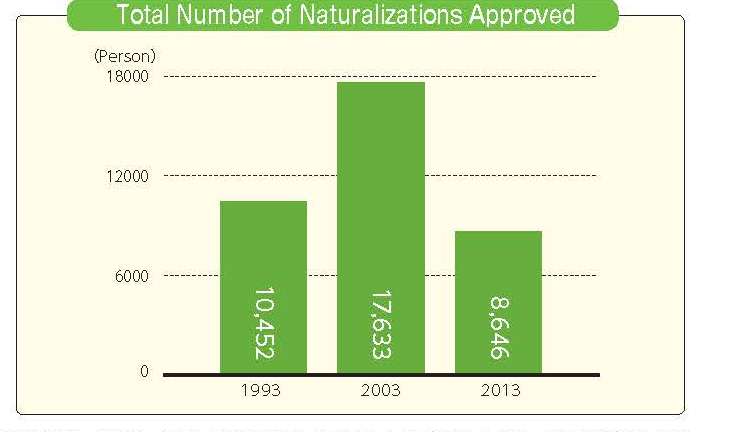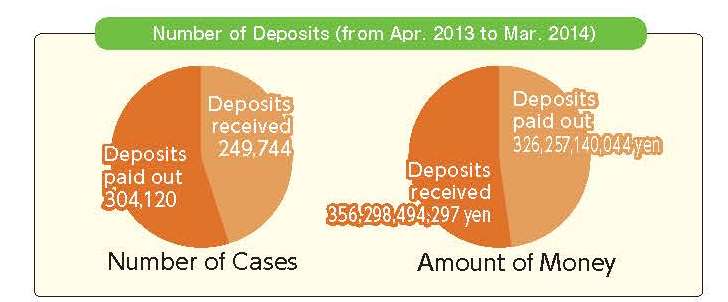Institution for Marking Your Rights
Registration (Real Property, Commercial, etc.)
Protection of Our Properties -The Real Property Registration System-
The Real Property Registration is a system which records the actual condition of our important property, including the location and area of the land and buildings, the name and address of the owner and the rights involved in the book of the public called "registry" and notifies this "registry" in order to contribute to smooth and safe dealings.
●If you don’t register...
Q: After many years of saving, I purchased my home. But later, someone who claims to be the owner of the house appeared. When I checked the registry, I found out that the name of the proprietor was the person who claimed to be the owner. According to my investigation, after I purchased the house, the seller sold the house to him at a higher price. Isn’t the owner of the building me since I bought the building earlier?
A: Unfortunately, you will not be able to claim ownership. Even if you purchased the house earlier, since your house is not registered, you will not be able to claim that to the third parties.
In order to avoid such trouble, it is important to carry out registration procedures as soon as possible after the completion of a transaction.
Defining the Divisions of Land -Development of Registry Office Equipping Map-
In order to clarify the section of the registered land, the registry office is intended to equip a map called “Registry Office Equipping Map" created based on the results of high survey system. However, the maintenance of registry office equipping map is not sufficient, since there are also many registry offices which are equipped with old maps that were created in the Meiji era. Professional personnel with advanced knowledge and many years of experience in the registry office promote the creation of Registry Office Equipping Map around the country.●Economic activities and registry office equipping map
When redevelopment of land around Roppongi Hills was conducted, it took a lot of time and money to define the boundary because there was only an old map. In order to prevent such a situation, a highly accurate registry office equipping map is needed. The development of registry office equipping maps supports the smooth economic activities.
Solving the Boundary Disputes -Parcel Boundary Demarcation-
"Parcel Boundary Demarcation" is a system in which registrars for parcel boundary demarcation (the officials of the Legal Affairs Bureau) who are experts on the abuttals of land, demarcate the registered lands based on the applications from the parties concerned.After conducting a variety of research, including field research and survey, the original parcel boundary is stipulated based on the registration, and the registrar clarifies the parcel boundary.
When the issues surrounding the parcel boundary of land has occurred, it is possible to achieve resolution of the problem by taking advantage of this system, without filing a litigation.
●What is "parcel boundary"?
The parcel boundary is a line that was defined as the scope of the land at the time of registration. The parcel boundary can not be changed by the agreement between the owners.

Enlightenment poster about Parcel Boundary Demarcation
Commercial and Corporate Registration
Companies play an indispensable role in the economic activities of our country, but they can only acquire their juridical personality, which is necessary in order to hold legal rights and obligations to carry out such economic activities, through commercial registration. Thus, commercial registration is an important system as a basis of the economic activities of companies in order to ensure the safety and smoothness of transactions. The Companies Act (which contains provisions to make corporate management more effective and flexible, to ensure that corporate management is kept open and in economic health and to amend the classifications of companies from the point of view of users) was enforced on May 1, 2006.The Act on General Incorporated Associations and General Incorporated Foundations
Based on this Act, associations which are not for profit are able to acquire a juridical personality simply through registration without the need for permission from the competent government agency. This system of juridical persons has had a great effect on social and economic activities because associations which are not for profit have easily been able to acquire a juridical personality, and registration has played a significant role as the basis for the system.
(enforced on December 1, 2008)
Efforts in the Registration Work
In addition to the above-mentioned development of legal systems, to establish a registration paperwork system appropriate to the advanced information society, enhancement of personnel structure of the personnel engaged in clerical registration; establishment of a paperwork system, such as mechanization and rationalization of office work; optimization of the placement of the registration office; and improvement of government buildings, etc. are pursued.Also, in order to comply with the needs of an IT society, registry information providing services through which one’s registration information can be verified on the Internet and the electronic certification system based on the commercial registry have been introduced. Furthermore, registration application of real property, commerce and company, transfer of chattels, transfer of receivables and adult guardianship are available online. The online application systems of registration of real estate, companies, movable property assignments, claim assignments and adult guardianship are available.

Family Registration
Family registration is the system that notarizes the kinship of individuals from birth until death. The registration is made for every Japanese national and is the only public document to certify that he or she has Japanese nationality. Family registration work is handled by each city, town or village, but the State (Director of the Legal Affairs Bureau or the District Legal Affairs Bureau) gives advice, suggestions or directions to ensure that the work of registration are performed in a smooth, proper and uniform manner throughout the whole country. The law that was enforced on December 1, 1994 to partially amend the Census Registration Act has enabled city, town or village offices designated by the Minister of Justice to deal with family registration work using computers, and as of December 31, 2014, a total of 1,860 (98.10%) cities, towns and villages use computers to handle the work. Meanwhile, the law that was enforced on May 1, 2008 to partially amend the Census Registration Act revised the conventional rule for the disclosure of family registration; restrictions were put on the cases where the third person can request for the issuance of the copy of family register etc. In addition, the amended law stipulates that identification must be shown when the applicant notifies his or her information for registration in order to prevent false registrations through false notification.
Nationality Administration
Nationality is the qualification of an individual to be a national of a particular country. The Ministry of Justice performs various functions related to Japanese nationality such as the following:
1 work related to naturalization when a foreign national wishes to acquire Japanese nationality
2 work related to acquisition of Japanese nationality through notification
3 work related to expatriation of Japanese nationality through notification
4 work related to the choice of nationality by a person who has dual nationality
5 work related to recognition of Japanese nationality
6 consultation about nationality
Meanwhile, the amended Nationality Act entered into force on January 1, 2009. The amended act has changed the conditions for acquiring Japanese nationality, under the provision of the third article of the Nationality Act, and established penal regulations.

1 work related to naturalization when a foreign national wishes to acquire Japanese nationality
2 work related to acquisition of Japanese nationality through notification
3 work related to expatriation of Japanese nationality through notification
4 work related to the choice of nationality by a person who has dual nationality
5 work related to recognition of Japanese nationality
6 consultation about nationality
Meanwhile, the amended Nationality Act entered into force on January 1, 2009. The amended act has changed the conditions for acquiring Japanese nationality, under the provision of the third article of the Nationality Act, and established penal regulations.

Deposit (Kyotaku) Administration
Deposit is a system designed to accomplish a certain legal objective by having a person entrust a sum of money or negotiable securities with a deposit office (legal affairs bureau or district legal affairs bureau) to guarantee the performance of his or her obligation and ultimately by having the other party who is entitled to that property acquire the money from the deposit office.
An online deposit application system has been implemented in response to an IT society. In addition, deposit for a continuing case can be easily made by presenting a deposit card, and a large number of deposits can be applied at the same time by using a dedicated application system tool.

●Deposit Administrator
The deposit administrators (officials of the Legal Affairs Bureau) who take charge of affairs at deposit offices are expected to have highly sophisticated legal knowledge, since deposit affairs are diverse including deposit for liquidation, pledge of damage in court, enforcement, the guarantee of business and candidacy; the related laws and regulations are also diverse.
An online deposit application system has been implemented in response to an IT society. In addition, deposit for a continuing case can be easily made by presenting a deposit card, and a large number of deposits can be applied at the same time by using a dedicated application system tool.

●Deposit Administrator
The deposit administrators (officials of the Legal Affairs Bureau) who take charge of affairs at deposit offices are expected to have highly sophisticated legal knowledge, since deposit affairs are diverse including deposit for liquidation, pledge of damage in court, enforcement, the guarantee of business and candidacy; the related laws and regulations are also diverse.
Notary System
Notarization is a system under which a notary, a State agent whose functions are to officially certify legal matters related to the life of a private person such as the conclusion of a contract, certifies matters as prescribed by law, by such means as preparing deeds. This system is designed to protect private rights but also to prevent disputes over civil matters from arising in the future. In this sense, it is a “preventive justice” system. In other words, this system has been designed to avoid future trouble or dispute over a contract by having a legal specialist (notary) participate in the preparation of the contract in advance and check the legality and the validity of the contact.
In addition, as for the notary system, electric notary system which enables the attestation of private documents, authorization of fixed dates, and the preservation and certification of electronic information has been introduced and has been in use since January 2002.
In addition, as for the notary system, electric notary system which enables the attestation of private documents, authorization of fixed dates, and the preservation and certification of electronic information has been introduced and has been in use since January 2002.
Notary
The functions of a notary under the Notary Law are, upon the request of a party or client, (1) to prepare notarial deeds for legal acts or facts related to private rights, (2) to attest a private deed and (3) to attest the articles of incorporation of a business corporation and, among the duties assigned to them by laws other than the Notary Law, a notary handles the preparation of wills, the work of affixing an enforcement sentence to a notarial deed, preparation of a protest to a bill or cheque and attaching a fixed date of preparation which has evidential value.The Ministry of Justice performs work concerning the notary system and the Minister of Justice (through the Directors of Legal Affairs Bureaus and District Legal Affairs Bureaus) appoints the notaries.
As of April 2015, about 500 notaries are working in about 300 notary offices throughout the country.
